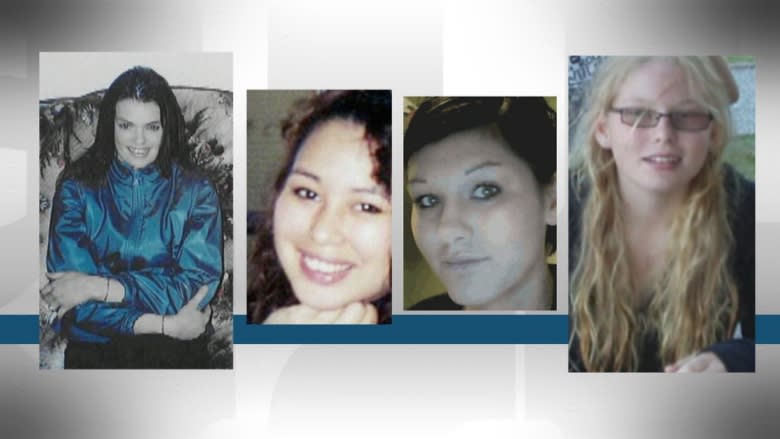Cody Legebokoff sentenced to life on 4 counts of 1st-degree murder

A B.C. Supreme Court justice in Prince George, B.C., has sentenced Cody Alan Legebokoff to life in prison with no parole for 25 years on four counts of first-degree murder.
The 24-year-old was convicted in the slayings of Loren Donn Leslie, Jill Stacey Stuchenko, Cynthia Frances Maas and Natasha Lynn Montgomery, who died in 2009 and 2010.
The courtroom was packed for the sentencing hearing Tuesday as the Crown asked the serial killer to be placed on the National Sex Offender Registry.
During sentencing, B.C. Supreme Court Justice Glen Parrett pointed out the "faint hope clause" to Legebokoff, which could allow him to apply for parole after serving 15 years in prison.
The provision was repealed in 2011 for multiple murders, but the murders in this case were committed before the law was changed.
"I just bit my lip, as you can see," was the reaction to the comments about parole from Doug Leslie, the father of 15-year-old Loren Leslie.
"I'm sure he's not ever going to see daylight, but just the way everything was put, the system still seems to lean to the criminal, you know?" said Leslie, who was seen with a bruised lip while standing outside the court.
Parrett told the court this case was one of his most difficult tasks, given the horrendous nature of the crime.
An emotional Parrett , his voice cracking during sentencing, had to pause and reach for a glass of water before continuing. The B.C. Supreme Court justice said there was no reasonable doubt as to who had murdered the victims — three women and one girl.
Referencing Legebokoff's explanation that other men, identified only as X, Y and Z, committed the actual murders, Parrett told the court, "Nothing is ever his fault. There is no evidence."
'A mistake to limit the seriousness of this issue'
Parrett also weighed in on calls for a national inquiry into the issue of missing and murdered women that would include both aboriginal and non-aboriginal victims. He pointed out that the budget for the RCMP's Highway of Tears investigation — looking into 18 murdered and missing women and girls — has been reduced by 84 per cent.
"It is a mistake to limit the seriousness of this issue," said Parrett.
Two of Legebokoff’s victims, Maas and Montgomery, were from First Nations families.
A spokesman for B.C.'s Criminal Justice Branch, said the case has been a long and challenging one for family members.
Jill Stuchenko was 35 when she became Legebokoff's first victim. The mother of five was found dead in a gravel pit off Otway Road, on the outskirts of Prince George, in 2009.
Crown counsel said that Stuchenko died from blunt force trauma to her head.
Natasha Montgomery, 23, originally from Quesnel, was reported missing in August 2010. Her body has not been found, but Crown counsel said in court that several items, including shirts, shorts, bedsheets, a comforter and an axe found in Legebokoff`s apartment tested positive for her DNA.
Cynthia Maas, 35, went missing in September 2010. Her remains were found in L.C. Gunn Park, in a remote area of Prince George, the following month.
Arrest came after 15-year-old killed
Police only cracked those cases after the death of a 15-year-old girl from Fraser Lake who had met Legebokoff online.
The teen, Loren Leslie, was found dead on a remote logging road just off Highway 27 near Vanderhoof, B.C., in November 2010.
Legebokoff was arrested after an RCMP officer stopped him after he was spotted turning onto the highway from that unused logging road. The officer reported seeing a blood smear on Legebokoff's face and legs, and there was a pool of blood in the truck.
A conservation officer, suspecting poaching, went up the logging road to investigate and found Leslie's body.
Investigators determined she had died only several hours before Legebokoff had been arrested.
Legebokoff had pleaded guilty to four counts of second-degree murder in B.C. Supreme Court, testifying that he was present at the deaths of the three women and the teenage girl, but that he did not commit the murders.
That plea was not accepted by the court.
Legebokoff, who was 19 when the first murder took place, is among Canada's youngest serial killers but is not the youngest on record.
In 1957, 17-year-old Peter Woodcock was imprisoned for the rape and murder of three young children in Toronto.
He was found not guilty by reason of insanity and spent the rest of his life behind bars, but still managed to kill another inmate before his own death in 2010.

